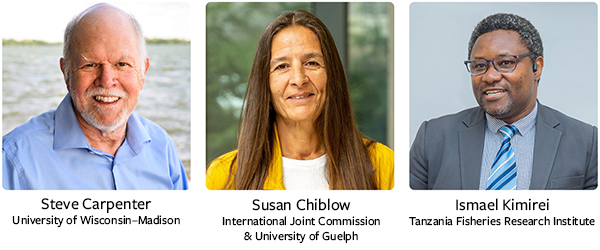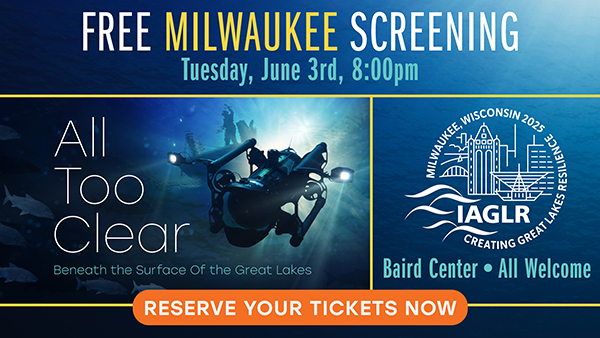June 2, 2025
IAGLR 2025 conference highlights latest science on large lakes
MILWAUKEE—Around 600 freshwater researchers and practitioners from the Great Lakes region and beyond will gather this week in Milwaukee, for the 68th Annual Conference on Great Lakes Research. Convened by the International Association for Great Lakes Research, the conference will be held at Baird Center over the next five days.
With three keynote speakers and more than 500 presentations in 39 sessions, the conference will explore the theme Creating Great Lakes Resilience.
Creating that resilience requires effective communication, both within the scientific community and with the broader public, according to IAGLR Executive Director Jérôme Marty. "We're looking forward to gathering for a week of shared science focused on the world's great lakes," he states. "The ongoing challenges facing science in the United States and around the world underscore the importance of communicating the value and impact of Great Lakes science."
Walk-in participants and media are welcome and must register. A welcome reception to kick off the conference will be held Monday, June 2, 6-9 p.m. on the N200 Level of Baird Center.

TUESDAY, JUNE 3
Steve Carpenter
University of Wisconsin–Madison
Resilience of lake ecosystems
WEDNESDAY, JUNE 4
Susan Chiblow
International Joint Commission / University of Guelph
Water Resiliency in the Great Lakes: Standing with Indigenous Science
THURSDAY, JUNE 5
Ismael Kimirei
Tanzania Fisheries Research Institute
Fisheries research in the African Great Lakes: A call to action
Advancing Ecosystem and Community Resilience to Oil Spills
Tuesday, June 3, 8 a.m.-5 p.m., and Wednesday, June 4, 8-10:20 a.m. CDT
Baird Center, N208B
This two-day session will highlight the importance of freshwater oil spill research and the collaborations between researchers, emergency managers, and coastal communities aimed at improving our ability to predict, prepare for, respond to, and recover from oil spills.
Fate and Transport of Microplastics, PFAS, and other Emerging Contaminants
Thursday, June 5, 8:20 a.m.-4:20 p.m. CDT
Baird Center, N206B
This session explores recent advancements in research on the characterization, fate, and transport of microplastics, per- and polyfluoroalkyl substances (PFAS), and other emerging contaminants
Plastic Debris in the Great Lakes: Advancements, Gaps, and Paths Forward
Thursday, June 5, 2-6 p.m. CDT
Baird Center, N207A
This session will gather diverse experts to showcase the advancements in plastic debris prevention, research methods, and results while identifying how to overcome gaps in the actionable reduction of Great Lakes macro and microplastics. Includes panel discussion.
Great Lakes Harmful Algal Bloom Resilience Through Informed Science, Policy, and Management
Thursday, June 5, 8:40 a.m.-4 p.m. CDT
Baird Center, N204A
This session will share recent advancements related to all aspects of Great Lakes HABs, including causes, consequences, and management considerations.
Advancing Resilience through Bridging Knowledges and Indigenous-led Research
Tuesday, June 3, 8:20 a.m.-4:40 p.m. CDT
Baird Center, N206B
This session emphasizes the importance of community-driven research, exploring how Indigenous leadership in environmental governance strengthens partnerships between Indigenous and non-Indigenous scholars, policymakers, and organizations. Includes panel discussion, opening and closing ceremonies.
View the Program Book for a detailed schedule of presentations.

Time: Tuesday, June 3, 8–10 p.m. CDT
Place: Baird Center, Rooftop Ballroom (North Building)
In "All Too Clear," cutting-edge underwater drones explore how quadrillions of tiny invasive quagga mussels are re-engineering the ecosystem of the Great Lakes at a scale not seen since the glaciers. Part scientific exploration, part natural history adventure – the film shines a spotlight on freshwater wildlife and environments like never before. The 90-minute film will be followed by a panel discussion.
Open to the public! Reserve your ticket!
The International Joint Commission’s Science Advisory Board has prepared a Great Lakes Decadal Science Strategy (view summary report) and is currently developing a more detailed Great Lakes Science Plan. The Science Plan will provide a compelling rationale for the need for an expanded science enterprise, describe science gaps and needs, identify an appropriate management and governance approach, and estimate the needed level of investment. This World café style facilitated mini-workshop, being held in conjunction with the IAGLR annual conference, is an opportunity to provide feedback and additions to formative content of the Science Plan. Attendees will provide input on two topics of their choosing that would benefit from further development (candidate topics include governance, training & workforce development, Indigenous Science, research infrastructure, and implementation considerations & business case) followed by a plenary discussion of breakout group findings and recommendations. Insights from participants will be considered in development of the Science Plan, which will be finalized by the end of 2025.
Paula McIntyre
IAGLR Communication Director
mcintyre@iaglr.org
Nicole Wood
Communication Coordinator
nwood@iaglr.org
Jérôme Marty
IAGLR Executive Director
jmarty@iaglr.org
Brianna Ellis
IAGLR Conference Coordinator
bellis@iaglr.org
What: 68th Annual Conference on Great Lakes Research
When: June 2–6, 2025
Where: Baird Center, 400 W. Wisconsin Ave., Milwaukee
Who: International Association for Great Lakes Research
Co-hosted by the University of Wisconsin-Milwaukee
School of Freshwater Sciences
Rebecca Klaper
Site Chair
University of Wisconsin–Milwaukee, School of Freshwater Sciences
rklaper@uwm.edu
Harvey Bootsma
Program Chair
University of Wisconsin–Milwaukee, School of Freshwater Sciences
hbootsma@uwm.edu